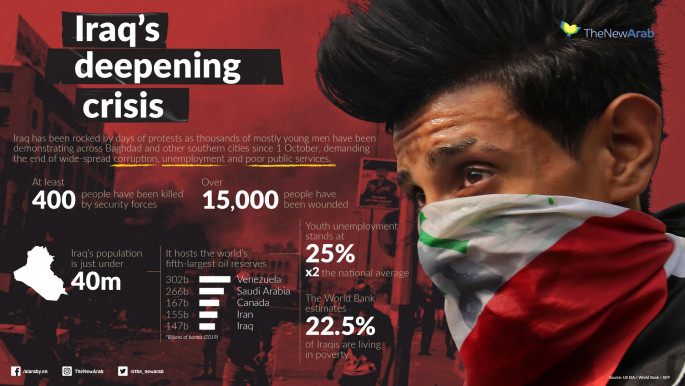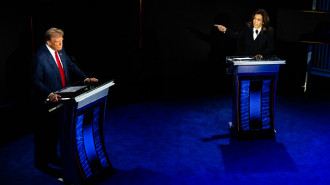US slaps sanctions on Iran-backed Iraqi paramilitary leaders over deadly crackdown on protesters
Secretary of State Mike Pompeo announced sanctions on Qais al-Khazali, Laith al-Khazali, and Hussein Falil Aziz al-Lami - all of which are part of of the Shia paramilitary force Hashed al-Shaabi, or Popular Mobilisation Forces.
The force leaders were designated under a law that will seize any assets they have in the United States and ban them from visiting the country.
The move came as President Donald Trump's administration, which considers Iran an arch-enemy, voiced alarm at rising attacks on US forces' bases in Iraq blamed on armed Shia groups backed by Tehran's clerical regime.
"The Iraqi people want their country back. They are calling for genuine reform and accountability and for trustworthy leaders who will put Iraq's national interests first," Pompeo said in a statement.
Separately, Pompeo also announced sanctions on one Iraqi politician, Khamis Farhan al-Khanjar al-Issawi, on bribery allegations.
The United States - which invaded Iraq in 2003 in a controversial war of regime change that led to chaos in the country - has increasingly accused Iran of interference in its neighbour.
Some 430 people have died across Iraq as security forces and paramilitaries cracked down on two months of protests triggered by concerns over unemployment and corruption.
 |
Twelve demonstrators were killed and dozens wounded late Friday after unidentified men attacked an anti-government protest camp in Baghdad.
Despite the violence, the demonstrations successfully led to the resignation of prime minister Adel Abdel Mahdi, a close ally of Iran who nonetheless managed a warm relationship with the United States.
Mulling troops
Meanwhile, the US says Iran has moved missiles into Iraq and has pointed the finger at Tehran over a rising number of sophisticated but non-lethal “mystery” rocket attacks on US bases.
In the latest incident, two rockets hit Al-Balad air base, north of Baghdad, late on Thursday, US officials said.
"We're waiting for full evidence, but if past is prologue, then there's a good chance that Iran was behind it," Schenker said.
Tensions have soared between the United States and Iran since Trump last year withdrew from a denuclearisation deal and imposed sweeping sanctions.
US officials say they are considering sending 5,000 to 7,000 troops to the region to counter Iran, although Defence Secretary Mark Esper on Friday again denied a report that a 14,000-strong deployment was under discussion.
The friction over Iraq comes after Iran itself quashed widespread protests that erupted on November 15 following a sudden hike in fuel prices.
On Friday, the United Nations said that at least 7,000 people have "reportedly" been arrested in Iran since mass demonstrations erupted last month, and called for the immediate release of those arbitrarily detained.
In a statement, the UN human rights office also said it had obtained "verified video footage" showing security forces firing on protesters, apparently with intent to kill.
The rights office added that it had "information suggesting that at least 208 people were killed" during the unrest, supporting a toll previously given by Amnesty International.
"There are also reports, which the UN Human Rights Office has so far been unable to verify, suggesting more than twice that number killed," the statement added.
The UN High Commissioner for Human Rights, Michelle Bachelet, said video obtained by her office shows "severe violence was used against protesters.”
Iran has yet to give overall figures for the number of people killed or arrested when security forces moved in to quell the unrest that saw buildings torched and shops looted.
Iran has blamed the violence that broke out during the protests on "thugs" backed by its foes the United States, Israel and Saudi Arabia.
Tehran has also dismissed the high death tolls reported by foreign sources as "utter lies".
Follow us on Twitter and Instagram to stay connected

![Palestinians mourned the victims of an Israeli strike on Deir al-Balah [Getty]](/sites/default/files/styles/image_684x385/public/2024-11/GettyImages-2182362043.jpg?h=199d8c1f&itok=xSHZFbmc)


![The law could be enforced against teachers without prior notice [Getty]](/sites/default/files/styles/image_684x385/public/2178740715.jpeg?h=a5f2f23a&itok=hnqrCS4x)
 Follow the Middle East's top stories in English at The New Arab on Google News
Follow the Middle East's top stories in English at The New Arab on Google News

![Voters in Michigan [Getty]](/sites/default/files/styles/image_330x185/public/2182490468.jpeg?h=a5f2f23a&itok=XMi_sWGX)
